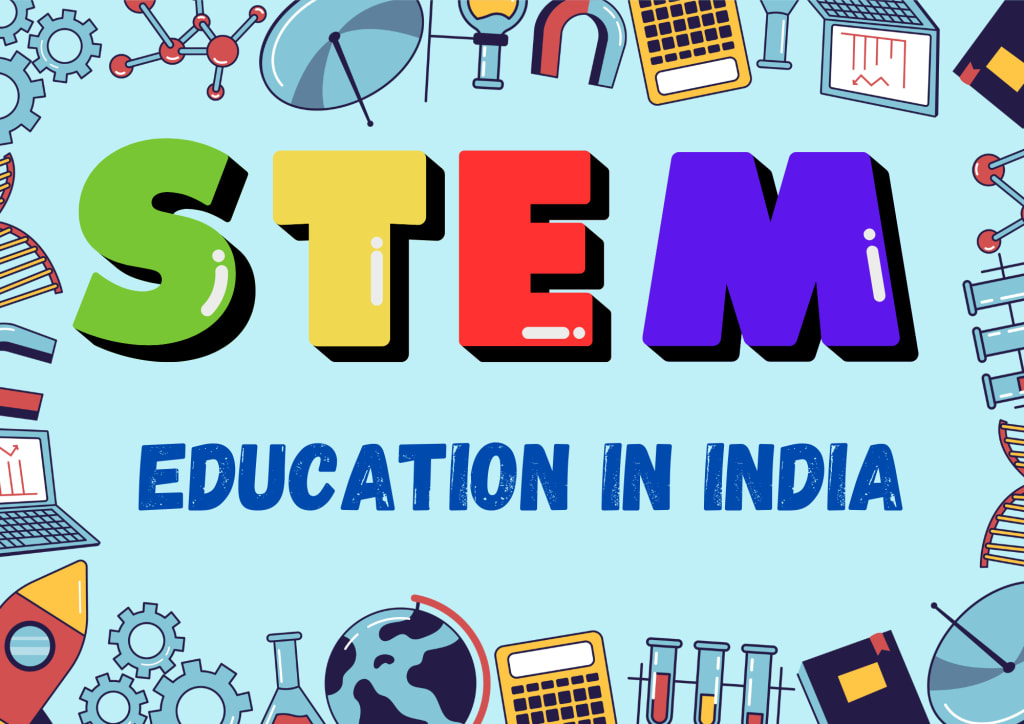STEM Education in India
Preparing Students for the Future

In recent years, there has been a growing emphasis on STEM education globally. STEM, which stands for Science, Technology, Engineering, and Mathematics, is pivotal in equipping students with the skills necessary for the future.
India, with its vast educational landscape, is increasingly recognizing the importance of STEM education.
This article explores the significance, current state, and future prospects of STEM education in India, particularly within the school education system. To know more, visit https://blog.edu123.in/preparing-students-for-stem-education-in-india/
The Importance of STEM Education
STEM education in India is not just about teaching science and mathematics; it's about integrating these subjects to foster critical thinking, problem-solving, and innovation. In a rapidly changing world driven by technology and scientific advancements, students need a strong foundation in these areas to compete globally. Moreover, STEM education in India aims to prepare students for careers that are yet to be created, making it essential for a dynamic and evolving job market.
Current State of STEM Education in Indian Schools
Government Initiatives
The Indian government has launched several initiatives to promote STEM education in India. Programs like Atal Tinkering Labs under the Atal Innovation Mission aim to foster curiosity, creativity, and imagination in young minds. These labs are equipped with cutting-edge tools and technologies to help students understand and innovate in STEM fields.
Private Sector Contributions
Private schools and organizations also play a significant role in advancing STEM education in India. Many schools have incorporated advanced STEM curricula, and several edtech companies offer online courses and workshops to supplement classroom learning. These efforts ensure that students have access to the latest in STEM education, regardless of their geographical location.
Challenges Facing STEM Education in India
Infrastructure and Resources
One of the primary challenges in enhancing **STEM education in India** is the lack of infrastructure and resources in many schools. While urban schools may have the facilities to provide hands-on STEM learning experiences, rural schools often struggle with basic educational resources. Bridging this gap is crucial for equitable STEM education.
Teacher Training
Effective **STEM education in India** requires well-trained teachers who are proficient in STEM subjects and teaching methodologies. However, there is a noticeable gap in teacher training, especially in rural areas. Professional development programs and continuous learning opportunities for teachers are essential to address this issue.
Curriculum and Pedagogy
The traditional Indian education system often emphasizes rote learning over critical thinking and practical application. To improve **STEM education in India**, there needs to be a shift towards more experiential and inquiry-based learning. Schools need to adopt a curriculum that encourages exploration and innovation.
Innovations in STEM Education in India
Digital Classrooms and Online Learning
Digital classrooms and online learning platforms are revolutionizing **STEM education in India**. With the proliferation of the internet and smartphones, students now have access to a plethora of online resources. Platforms like BYJU'S, Vedantu, and Khan Academy offer interactive and engaging STEM courses that supplement school education.
Robotics and Coding
Introducing robotics and coding at an early age is becoming increasingly popular in Indian schools. These subjects not only make learning fun but also help students develop problem-solving skills and logical thinking. Schools are setting up robotics labs and collaborating with organizations like RoboGenius and LEGO Education to provide practical STEM experiences.
Interdisciplinary Learning
Interdisciplinary learning is another innovative approach to **STEM education in India**. By integrating arts, humanities, and social sciences with STEM subjects, students can develop a more holistic understanding of real-world problems. This approach encourages creativity and critical thinking, essential skills for the 21st century.
Case Studies of Successful STEM Education Models in India
Delhi Public School (DPS), Bangalore
DPS Bangalore is a leading example of how schools can effectively implement **STEM education in India**. The school has a dedicated STEM lab where students can engage in hands-on experiments and projects. The curriculum includes robotics, coding, and regular STEM fairs to showcase student innovations.
Birla Institute of Technology and Science (BITS) Pilani
BITS Pilani, though primarily a higher education institution, has programs that influence school-level **STEM education in India**. Their outreach programs involve mentoring school students, conducting workshops, and providing access to their state-of-the-art laboratories.
The Future of STEM Education in India
Policy Reforms
The National Education Policy (NEP) 2020 emphasizes the importance of **STEM education in India**. It advocates for experiential learning, critical thinking, and the integration of technology in education. Implementing these reforms at the grassroots level will be crucial for the future of STEM education.
Collaboration with Industry
Collaboration between schools and industry can significantly enhance **STEM education in India**. Companies can provide resources, mentorship, and real-world problem-solving opportunities. Such partnerships can help students understand the practical applications of their learning and inspire them to pursue careers in STEM fields.
Focus on Inclusivity
Ensuring that **STEM education in India** is inclusive and accessible to all students, regardless of their socio-economic background, is vital. Special initiatives to encourage girls and underrepresented communities in STEM will help create a more diverse and equitable STEM workforce in the future.
Conclusion
STEM education in India is crucial for preparing students to face the challenges of the future. While there are significant strides being made, there is still a long way to go in terms of infrastructure, teacher training, and curriculum development. By leveraging technology, fostering innovation, and ensuring inclusivity, India can create a robust STEM education ecosystem that equips students with the skills they need to succeed in a rapidly evolving world.
As **STEM education in India** continues to evolve, it promises to open up new opportunities for students, empowering them to become the innovators and leaders of tomorrow. With continued efforts from the government, private sector, and educational institutions, **STEM education in India** will undoubtedly play a pivotal role in shaping the country's future.
About the Creator
Enjoyed the story? Support the Creator.
Subscribe for free to receive all their stories in your feed. You could also pledge your support or give them a one-off tip, letting them know you appreciate their work.





Comments (1)
Appreciate your work.